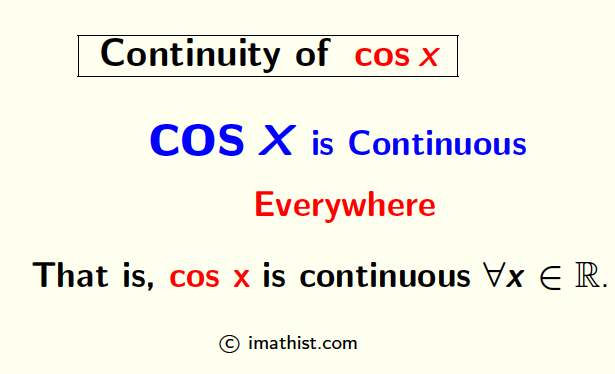For any real number c, we have limx→ccosx = cosc and cosx is defined for all real numbers. Thus, the function cosx is continuous everywhere.

Now, we will prove that cosx is continuous for all values of x by the epsilon-delta method. We will use the following two formulas:
- $\cos x -\cos y=2\sin \dfrac{x+y}{2} \sin \dfrac{y-x}{2}$
- $|\sin x| \leq |x|$
Prove cosx is continuous
Let f(x)=cosx and let x=c be an arbitrary real number.
Let ε>0 be any given positive number. We need to find a positive δ such that
|f(x)-f(c)| < ε whenever 0<|x-c|<δ
Choose δ=ε.
Now, for $x \in \{0<|x-c| <\delta=\epsilon\}$, we have that
$|f(x)-f(c)| = |\cos x -\cos c|$
$=2 |\sin \dfrac{x+c}{2} \sin \dfrac{c-x}{2}|$ by the above Formula 1.
$\leq 2 |\sin \dfrac{c-x}{2}|$ as we know that sinθ≤1 for all values of θ.
$\leq 2 |\dfrac{x-c}{2}|$ by the above Formula 2.
= |x-c|
< ε.
This shows that for any given ε>0, there exists a δ>0 such that whenever 0<|x-c|<δ, we have
|f(x)-f(x)| < ε.
Thus, by the epsilon-delta definition of continuity, we conclude that cosx is a continuous function at x=c. As c was an arbitrary real number, cosx is everywhere continuous.
ALSO READ
Epsilon-Delta definition of Limit
Prove that modulus of x is continuous
Mod x-a is continuous at x=a but NOT differentiable
FAQs
Q: cosx is continuous or not?
Answer: Yes, cosx is a continuous function, because limx→ccosx = cosc and cosx is defined for any real number c.